初中英语语法课件
合集下载
初中英语语法大全PPT课件
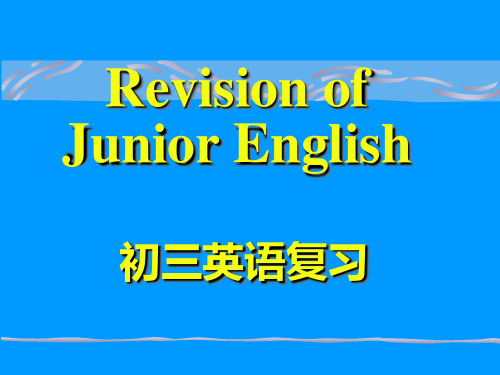
A. the first B. one of C. the second D. second
Pronouns
代词
代词的分类
人称代词 Personal Pronouns 物主代词 Possessive Pronouns 反身代词 Self Pronouns 不定代词 Indefinite Pronouns 指示代词 Demonstrative Pronouns 疑问代词 Interrogative Pronouns
* You, she and I all enjoy the music. 你我她都喜欢音乐。
4.she可以用来代表国家、船只、大
地、月亮等
* We love our motherland, we hope she’ll be stronger and bigger.
我们热爱我们的祖国,我们希望她更强大。
( C)5 The idea became ____ . He wanted to try
____.
A. strangly, it out B. strangly, out it
C. strange, it out D. strange, out it
( C)6 Beijing is ____ biggest cities in China.
4) 可用much, still, a little, even, far,three years等表示程度的状语来 修饰比较级
2. “the + 比较级,the + 比较级” 表示“ 越······就越······” *The more, the better.
越多越好。 THE+比较级。。。THE+比较级。。。
Revision of Junior English
Pronouns
代词
代词的分类
人称代词 Personal Pronouns 物主代词 Possessive Pronouns 反身代词 Self Pronouns 不定代词 Indefinite Pronouns 指示代词 Demonstrative Pronouns 疑问代词 Interrogative Pronouns
* You, she and I all enjoy the music. 你我她都喜欢音乐。
4.she可以用来代表国家、船只、大
地、月亮等
* We love our motherland, we hope she’ll be stronger and bigger.
我们热爱我们的祖国,我们希望她更强大。
( C)5 The idea became ____ . He wanted to try
____.
A. strangly, it out B. strangly, out it
C. strange, it out D. strange, out it
( C)6 Beijing is ____ biggest cities in China.
4) 可用much, still, a little, even, far,three years等表示程度的状语来 修饰比较级
2. “the + 比较级,the + 比较级” 表示“ 越······就越······” *The more, the better.
越多越好。 THE+比较级。。。THE+比较级。。。
Revision of Junior English
初中英语语法讲解课件
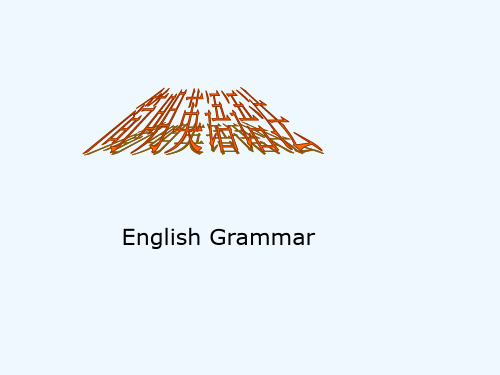
名词复数的不规则变化
1)child---children foot---feet
tooth---teeth
mouse---mice
man---men
woman---women
注意:与 man 和 woman构成的合成
词,其复数形式也是 -men 和-women。
如: an Englishman,two
1.2名词复数的规则变化(P5)
____________________________
_______________________
情况 构成方法 读音
例词
____________________________
______________________
一般情况
加 -s 1.清辅音后读
/s/; map-maps
蛋糕是一种食物。 (不可数) These cakes are sweet.
这些蛋糕很好吃。 (可数) b. 当物质名词表示该物质的种类时,
名词可数。 This factory produces steel.
(不可数) We need various steels. (可数)
c. 当物质名词表示份数时,可数。
2) man, woman, gentleman等作定 语时,其单复数以所修饰的名词的单复数
3) 有些原有s结尾的名词,作定语时,s保留。 如:goods train (货车) arms produce 武器生产 customs papers 海关文件 clothes brush衣刷
4) 数词+名词作定语时,这个名词一般保留单数形式。 如:two-dozen eggs 两打/(二十四个鸡蛋) a ten-mile walk 十里路 two-hundred trees 两百棵树 a five-year plan 一个五年计划
初中英语语法讲解课件
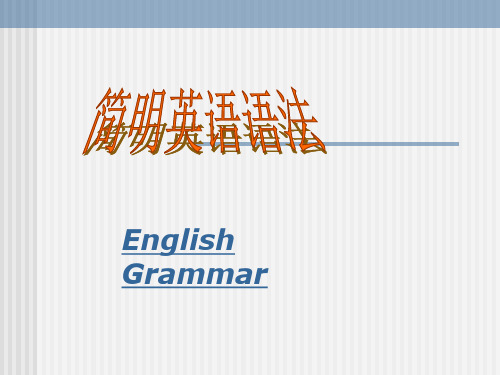
5) 表示由两部分构成的东西,如:glasses (眼镜) trousers, clothes 若表达具体数目,要借助数量词 pair(对,双); suit(套); a pair of glasses; two pairs of trousers 6) 另外还有一些名词,其复数形式有时可表示特别意思,如: goods货物,waters水域,fishes(各种)鱼
不规则变化
4)以s结尾,仍为单数的名词,如: a. maths,politics,physics等学科名词,为不可数名词,是单 数。 b. news 是不可数名词。 c. the United States,the United Nations 应视为单数。 The United Nations was organized in 1945. 联合国是 1945年组建起来的。 d. 以复数形式出现的书名,剧名,报纸,杂志名,也可视为单数。 "The Arabian Nights" is a very interesting story-book. <<一千零一夜>>是一本非常有趣的故事书。
2) 代表一类人或物。 A knife is a tool for cutting with. Mr. Smith is an engineer.
3) 词组或成语。 a little / a few / a lot / a type of / a pile / a great many / many a / as a rule / in a hurry / in a minute / in a word /in a short while / after a while / have a cold / have a try / keep an eye on / all of a sudden
不规则变化
4)以s结尾,仍为单数的名词,如: a. maths,politics,physics等学科名词,为不可数名词,是单 数。 b. news 是不可数名词。 c. the United States,the United Nations 应视为单数。 The United Nations was organized in 1945. 联合国是 1945年组建起来的。 d. 以复数形式出现的书名,剧名,报纸,杂志名,也可视为单数。 "The Arabian Nights" is a very interesting story-book. <<一千零一夜>>是一本非常有趣的故事书。
2) 代表一类人或物。 A knife is a tool for cutting with. Mr. Smith is an engineer.
3) 词组或成语。 a little / a few / a lot / a type of / a pile / a great many / many a / as a rule / in a hurry / in a minute / in a word /in a short while / after a while / have a cold / have a try / keep an eye on / all of a sudden
初中英语语法大全(详解)ppt课件
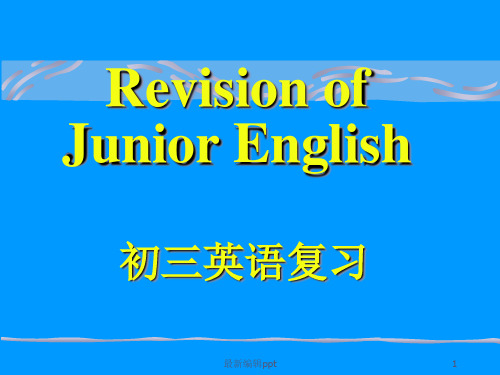
* They haven’t come back yet.
★ such 修饰名词 so 修饰形容词、副词
*I have never seen such an
interesting film.
*This box is so heavy that I can’t
carry it.
最新编辑ppt
3
★ alone(单独、独自)作表语=by oneself lonely(孤独的)可作表语、定语
你的英语越来越好了。
*These days more and more people are learning English.
现在学英语的人越来越多了。
最新编辑ppt
18
2. “the + 比较级,the + 比较级”
表示“ 越······就越······”
*The more, the better.
*He is the most careful among us.
最新编辑ppt
15
3) 在表示 “和······一样······” 和 “不及······” 这类概念时,可以用 “as+原级+as” 和 “not as(so)+ 原级+as”的句型
*Our teacher is as busy as before.
carefully - more carefully
- most carefully
最新编辑ppt
11
不规则变化
good/well – better – best many/much – more – most little – less – least far – farther – farthest ( far – further – furthest ) bad/badly/ill – worse – worst
初中英语零基础学语法--英语句子结构 课件(共43张PPT)

附属成分
基本成分的修饰语。可以是: • 定语:即用来修饰名词的单词、短语或从句 • 状语:即用来修饰名词或代词以外的词的单词、短语或从句。
定语
Poor John tottered toward a hospital nearby. She likes oranges imported from the USA.
省略成分
句中被省略的成分,虽然未说出来,却在句中表示 一定的意思:
(You) Come here. (I wish you)Good luck! Some gave him praises,but others(gave him)rotten eggs.
He runs as fast as, if ( he does ) not ( run ) faster, than you. ( I ) Hope you like it. John should clean the room today and Peter ( should clean it ) tomorrow.
主语、动词(不及物动词、及物动词、双宾动词、系动词、宾 补动词)、宾语及补语可以称为基本句子成分。完整的句子一 般至少包含2个基本成分,至多4个基本成分。
Vi(不及物动词)
主 语
谓 语
Vt(及物动词)
宾语 宾语(直) 宾语(间) 宾语 宾补
系动词
表语
be / feel / seem / look appear / stand / lie become /get / grow / turn go / come / remain/ keep taste / smell etc.
连接成分
连接成分实际上是一个连词,用来连接两个或几个平行的词、
初中英语语法课件ppt

vacation together.
过去将来时的使用:
一、过去将来时表示对于过去某一时间而言将要发生的动 作或存在的状态。 would或was /were going to + V
would可用于各种人称。
二、would +V还可表示过去的习惯动作,在这点上同used to同义。
When we were children, we would/used to go swimming every summer.
e) 用于条件从句“如果……想,设想”(接近if ……want to,或 if ……should) 例:Greater efforts to increase agricultural production must be made if food shortage ____________ avoided. A) is to be B) can be C) will be D) has been
一般现在时的动词形式: 动词原形 1.am;is ;are 2.have,has 3.第三人称单数形式-(e)s
肯定句:I watch television every day.
否定句:I don’t watch television every day.
疑问句:Do you watch television every day.
一般现在时的使用:
1.一般现在时表示总是、通常、习惯 性的动作或状态。
It snows in winter. I watch television every day.
2.用于对客观事实的普遍性的陈述。
Water consists of hydrogen and oxygen. Most animals kill only for food. The world is round.
过去将来时的使用:
一、过去将来时表示对于过去某一时间而言将要发生的动 作或存在的状态。 would或was /were going to + V
would可用于各种人称。
二、would +V还可表示过去的习惯动作,在这点上同used to同义。
When we were children, we would/used to go swimming every summer.
e) 用于条件从句“如果……想,设想”(接近if ……want to,或 if ……should) 例:Greater efforts to increase agricultural production must be made if food shortage ____________ avoided. A) is to be B) can be C) will be D) has been
一般现在时的动词形式: 动词原形 1.am;is ;are 2.have,has 3.第三人称单数形式-(e)s
肯定句:I watch television every day.
否定句:I don’t watch television every day.
疑问句:Do you watch television every day.
一般现在时的使用:
1.一般现在时表示总是、通常、习惯 性的动作或状态。
It snows in winter. I watch television every day.
2.用于对客观事实的普遍性的陈述。
Water consists of hydrogen and oxygen. Most animals kill only for food. The world is round.
初中英语语法课件

• 5. She __________ (not want) to stay in bed while the others ________________ (all, work) in the fields.
第二十页,共27页。
过去完成时
• 构成:
• had+动过去分词 • 多用于复合句中
• 用法:
• 3. He ________ very busy this week, he ________ free next week.
• A. will be; is B. is; is C. will be; will be D. is; will beave / has +PP
第四页,共27页。
• 练习题: • 1. We often__________(play) in the playgound. • 2. He _________(get) up at six o’clock.
• 3. __________you _________(brush) your teeth ev ery morning.
• 2. “_______ you _______ (write) a letter to your aunt yet?〞
• “Yes, I ___________. I ________________ (writ e) one last week.〞 、 3. “_________ he ____ (finish) his homework? 〞 “Not yet.〞 、 4. “_________ they ever __________ (be) abroad? 〞 “Yes, just once.〞 、 5. Your father _________ just ___________ (finish) his work.
第二十页,共27页。
过去完成时
• 构成:
• had+动过去分词 • 多用于复合句中
• 用法:
• 3. He ________ very busy this week, he ________ free next week.
• A. will be; is B. is; is C. will be; will be D. is; will beave / has +PP
第四页,共27页。
• 练习题: • 1. We often__________(play) in the playgound. • 2. He _________(get) up at six o’clock.
• 3. __________you _________(brush) your teeth ev ery morning.
• 2. “_______ you _______ (write) a letter to your aunt yet?〞
• “Yes, I ___________. I ________________ (writ e) one last week.〞 、 3. “_________ he ____ (finish) his homework? 〞 “Not yet.〞 、 4. “_________ they ever __________ (be) abroad? 〞 “Yes, just once.〞 、 5. Your father _________ just ___________ (finish) his work.
初中英语语法大全精品PPT课件

多时,谓语用复数。 如:There is a sheep in the yard.(院子里有只绵羊)
There are some sheep in the yard.(院子里有一些绵羊) 4、maths, news等虽然有s结尾,但不是复数,因此谓语仍用单数: 如:The news is very exciting. (这个消息令人兴奋)
[注解]:
① ‘s还可以表示某人的家或者某个店铺, 如:my aunt’s(我阿姨家), the doctor’s(诊所)
② 两人共有某物时,可以采用 A and B’s 的形 如:Lucy and Lily’s bedroom(露西和丽丽合住的卧室)
Lucy’s and Lily’s bedroom(露西和丽丽分别的卧室)
如果表示整体概念,则谓语用单数形式, 如:Class Three is a very good class.(三班是好班) 如果表示其中的所有成员时,则谓语用复数形式, 如:Class Three have a map of China.(三班有张中国地图) 3、Chinese, Japanese, fish, sheep, people等表示单个时谓语用单数,表示许
如: box, child, orange;
不可数名词{u} 是不可以用简单的数词进行计数的名词。
如:water, news, oil, population, information .
英语可数名词的单复数
1、名词由单数变复数的基本方法如下: ①在单数名词词尾加s。 如:map → maps,boy→ boys,horse→ horses, table→ tables. ②s,o,x ,sh,ch结尾的词加es. 如:class→classes, box→boxes, hero→heroes, dish→dishes,
There are some sheep in the yard.(院子里有一些绵羊) 4、maths, news等虽然有s结尾,但不是复数,因此谓语仍用单数: 如:The news is very exciting. (这个消息令人兴奋)
[注解]:
① ‘s还可以表示某人的家或者某个店铺, 如:my aunt’s(我阿姨家), the doctor’s(诊所)
② 两人共有某物时,可以采用 A and B’s 的形 如:Lucy and Lily’s bedroom(露西和丽丽合住的卧室)
Lucy’s and Lily’s bedroom(露西和丽丽分别的卧室)
如果表示整体概念,则谓语用单数形式, 如:Class Three is a very good class.(三班是好班) 如果表示其中的所有成员时,则谓语用复数形式, 如:Class Three have a map of China.(三班有张中国地图) 3、Chinese, Japanese, fish, sheep, people等表示单个时谓语用单数,表示许
如: box, child, orange;
不可数名词{u} 是不可以用简单的数词进行计数的名词。
如:water, news, oil, population, information .
英语可数名词的单复数
1、名词由单数变复数的基本方法如下: ①在单数名词词尾加s。 如:map → maps,boy→ boys,horse→ horses, table→ tables. ②s,o,x ,sh,ch结尾的词加es. 如:class→classes, box→boxes, hero→heroes, dish→dishes,
初中英语语法专题课件完整版(共983张PPT)

2.不规则变化
构成方法
例词
形式不变 (单复数同形)
sheep-sheep deer-deer Chinese-Chinese Japanese-Japanese
变内部元音字母
foot-feet tooth-teeth goose-geese man-men mouse-mice
词尾加-en/-ren
a group of 一队,一组,一群
②还可用much,little,a little of,a large amount/deal of, no,plenty of等来修饰不可数名词,some,any既可修饰可数名词也可修 饰不可数名词。
much money,plenty of water a little of air some(肯定句): some milk ,some apples any(疑/否):Are there any stamps?I don’t have any money (5)数词-名词-形容词构成的复合形容词,中间的名词不能用
普通名词又可分为下面四类:
1)个体名词:表示单个人或单个事物。 如:gun、kid 、book。 2)集体名词:表示一群人或一些事物组成的集合体。 如:family。
3)物质名词:表示无法分为个体的物质、材料、食品、饮料、液体、气体、 金属等名称的名词,
如:pork、wood、bread、water、air。 4)抽象名词:表示动作、状态、品质、感情等抽象概念及学科、疾病。 如:work 。Hunger、honesty 、love、Chinese、success、HIV。 个体名词和集体名词可以用数目来计算,称为可数名词。
f,fe 为v,再加 -es
shelf-shelves thief-thieves
初中英语语法大全(详解)ppt课件
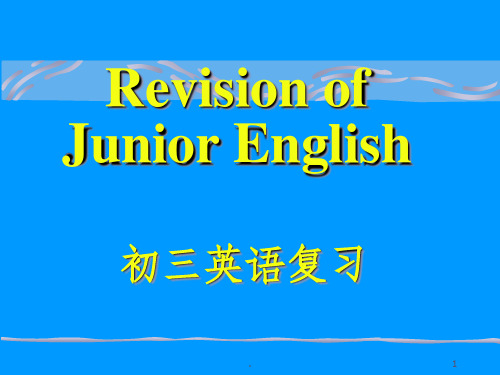
你的英语越来越好了。
*These days more and more people are learning English.
现在学英语的人越来越多了。
.
18
2. “the + 比较级,the + 比较级”
表示“ 越······就越······”
*The more, the better.
越多越好。
Revision of Junior English
初三英语复习
.
1
Adjectives and Adverbs
形容词、副词
.
2
区别几组易混淆的副词、形容词
★ already 常用于肯定句、个别疑问句
yet 常用于否定句、疑问句
* The train has already gone.
* They haven’t come back yet.
*He is the most careful among us.
.
15
3) 在表示 “和······一样······” 和 “不及······” 这类概念时,可以用 “as+原级+as” 和 “not as(so)+ 原级+as”的句型
*Our teacher is as busy as before.
*Who is taller, Mary or Jane?
*Which is biggest, the sun, the moon or the earth?
.
23
7)掌握几种同义句转换
1. He is taller than any other student in his class.
= He is taller than the other students in his class.
初中英语语法大全免费ppt详解.

第7页,共74页。
规则变化
单音节词和少数双音节词
2) 以字母 e 结尾加 –r 或 –st
fine – finer – finest
late – later – latest nice – nicer – nicest
第8页,共74页。
规则变化 单音节词和少数双音节词
3) 重读闭音节、末尾只有一个辅音
(优选)初中英语语法大全免费 课件
第1页,共74页。
Adjectives
and Adverbs
形容词、副词
第2页,共74页。
区别几组易混淆的副词、形容词
★ already 常用于肯定句、个别疑问句 yet 常用于否定句、疑问句 * The train has already gone. * They haven’t come back yet.
a rest on Sunday. (hard)
2 __L_u_c_k__il_y__, he didn’t fail in the exam.(luck) 3 He was so _s_u_r_p_r_i_s_e_d_ that he couldn’t believe this _s_u_r_p_r_i_s_in__g news. (surprise)
= He is taller than the other students in his class.
= He is taller than any of the other students in his class.
= He is the tallest (student)in his class.
代词的分类
人称代词 Personal Pronouns 物主代词 Possessive Pronouns
规则变化
单音节词和少数双音节词
2) 以字母 e 结尾加 –r 或 –st
fine – finer – finest
late – later – latest nice – nicer – nicest
第8页,共74页。
规则变化 单音节词和少数双音节词
3) 重读闭音节、末尾只有一个辅音
(优选)初中英语语法大全免费 课件
第1页,共74页。
Adjectives
and Adverbs
形容词、副词
第2页,共74页。
区别几组易混淆的副词、形容词
★ already 常用于肯定句、个别疑问句 yet 常用于否定句、疑问句 * The train has already gone. * They haven’t come back yet.
a rest on Sunday. (hard)
2 __L_u_c_k__il_y__, he didn’t fail in the exam.(luck) 3 He was so _s_u_r_p_r_i_s_e_d_ that he couldn’t believe this _s_u_r_p_r_i_s_in__g news. (surprise)
= He is taller than the other students in his class.
= He is taller than any of the other students in his class.
= He is the tallest (student)in his class.
代词的分类
人称代词 Personal Pronouns 物主代词 Possessive Pronouns
- 1、下载文档前请自行甄别文档内容的完整性,平台不提供额外的编辑、内容补充、找答案等附加服务。
- 2、"仅部分预览"的文档,不可在线预览部分如存在完整性等问题,可反馈申请退款(可完整预览的文档不适用该条件!)。
- 3、如文档侵犯您的权益,请联系客服反馈,我们会尽快为您处理(人工客服工作时间:9:00-18:30)。
? • A. left B. leaves C. leaved D. was leaving • 3. One of us ______band last month. • A. leaves B. leave C. leaved D. left
一般将来时
• 构成: • be going to+V原 • will / shall + V原
现在进行时
• 构成: • be+doing
• 用法: • 表此时此刻正进行的动作或状态
• 象征词: • listen look now • all the time Don’t…
现在进行时
规则变化: • 一般去e 双写+ing • 不规则变化: • tie die lie – • 变ie为y加ing
• A. isn't working B. doesn't working C. isn't g oing to working D. won't work
• 3. He ________ very busy this week, he _____ ___ free next week.
• A. will be; is B. is; is C. will be; will be D. is; will be
• 用法: • 表示经常性的 • 动作或状态
• 象征词: • Every often always on 天 in月、季、节、年。
一般现在时
• 规则变化: • 一般-s –es 辅音+y---ies • 不规则变化: • have----has
• 例句: • He goes to school every day. • I often have lunch at home.
• 练习题: • 1. We often__________(play) in the playgound. • 2. He _________(get) up at six o’clock. • 3. __________you _________(brush) your teeth
every morning. • 4. What __________(do) he usually__________
• 练习题:
• 1. There __________ a meeting tomorrow after noon. A. will be going to B. will going to be C. is going to be D. will go to be
• 2. Charlie ________ here next month.
初中英语语法总结
初中语法分类
• 初中语法项目分类:(共8类) • 一般分类 • 1、一般现在时 • 2、一般过去时 • 3、一般将来时 • 4、现在进行时 • 5、现在完成(进行)时 • 6、过去进行时 • 7、过去完成时 • 8、过去将来时
一般现在时
• 构成: • 动词用原形 • 三人称单数-s / es
• 练习题: • 1. What _____they _____dinner yesterday ? • A. do; have for B. did; had for C. did; have for
D. were; have for • 2. Could you tell me what time the plane ______
• 象征词: • ago/just now /In1998 last/yesterday 等
一般过去时
• 规则变化: • 一般/去e 双写/辅+y结尾-ied • 不规则变化: • go-went come-came • do-did leave-left等
• 例句: • He wrote a letter yesterday. • I studied hard last year.
• 例句: • Tom is writing now . • They are lying on the bed .
• 练习题:
• 1. There __________ a meeting tomorrow after noon. A. will be going to B. will going to be C. is going to be D. will go to be
• 2. Charlie ________ here next month.
• A. isn't working B. doesn't working C. isn't g oing to working D. won't work
• 3. He ________ very busy this week, he _____ ___ free next week.
• 用法: • 在将来某个时间或 • 某段时要做的事
• 象征词: • tomorrow / after • next / tonight in 2010
一般将来时不规则变化: 来自 Go come leave stay • fly等用进行表将来
• 例句: • Are you going to read ? • He is coming tomorrow .
• A. will be; is B. is; is C. will be; will be D. is; will be
现在完成时
• 构成: • have / has +PP • have/has been+doing
• 用法: • 发生在过去影响在现在的动作或状态等
• 象征词: • 含糊的频率副词 already just never ever
(do) after school? • 5. Danny _________ (study) English, Chinese,
Maths, Science and Art an school.
一般过去时
• 构成: • 动词用过去时 • Be—was/ were
• 用法: • 表过去某个、段时间内动作及状态
现在完成时
一般将来时
• 构成: • be going to+V原 • will / shall + V原
现在进行时
• 构成: • be+doing
• 用法: • 表此时此刻正进行的动作或状态
• 象征词: • listen look now • all the time Don’t…
现在进行时
规则变化: • 一般去e 双写+ing • 不规则变化: • tie die lie – • 变ie为y加ing
• A. isn't working B. doesn't working C. isn't g oing to working D. won't work
• 3. He ________ very busy this week, he _____ ___ free next week.
• A. will be; is B. is; is C. will be; will be D. is; will be
• 用法: • 表示经常性的 • 动作或状态
• 象征词: • Every often always on 天 in月、季、节、年。
一般现在时
• 规则变化: • 一般-s –es 辅音+y---ies • 不规则变化: • have----has
• 例句: • He goes to school every day. • I often have lunch at home.
• 练习题: • 1. We often__________(play) in the playgound. • 2. He _________(get) up at six o’clock. • 3. __________you _________(brush) your teeth
every morning. • 4. What __________(do) he usually__________
• 练习题:
• 1. There __________ a meeting tomorrow after noon. A. will be going to B. will going to be C. is going to be D. will go to be
• 2. Charlie ________ here next month.
初中英语语法总结
初中语法分类
• 初中语法项目分类:(共8类) • 一般分类 • 1、一般现在时 • 2、一般过去时 • 3、一般将来时 • 4、现在进行时 • 5、现在完成(进行)时 • 6、过去进行时 • 7、过去完成时 • 8、过去将来时
一般现在时
• 构成: • 动词用原形 • 三人称单数-s / es
• 练习题: • 1. What _____they _____dinner yesterday ? • A. do; have for B. did; had for C. did; have for
D. were; have for • 2. Could you tell me what time the plane ______
• 象征词: • ago/just now /In1998 last/yesterday 等
一般过去时
• 规则变化: • 一般/去e 双写/辅+y结尾-ied • 不规则变化: • go-went come-came • do-did leave-left等
• 例句: • He wrote a letter yesterday. • I studied hard last year.
• 例句: • Tom is writing now . • They are lying on the bed .
• 练习题:
• 1. There __________ a meeting tomorrow after noon. A. will be going to B. will going to be C. is going to be D. will go to be
• 2. Charlie ________ here next month.
• A. isn't working B. doesn't working C. isn't g oing to working D. won't work
• 3. He ________ very busy this week, he _____ ___ free next week.
• 用法: • 在将来某个时间或 • 某段时要做的事
• 象征词: • tomorrow / after • next / tonight in 2010
一般将来时不规则变化: 来自 Go come leave stay • fly等用进行表将来
• 例句: • Are you going to read ? • He is coming tomorrow .
• A. will be; is B. is; is C. will be; will be D. is; will be
现在完成时
• 构成: • have / has +PP • have/has been+doing
• 用法: • 发生在过去影响在现在的动作或状态等
• 象征词: • 含糊的频率副词 already just never ever
(do) after school? • 5. Danny _________ (study) English, Chinese,
Maths, Science and Art an school.
一般过去时
• 构成: • 动词用过去时 • Be—was/ were
• 用法: • 表过去某个、段时间内动作及状态
现在完成时
